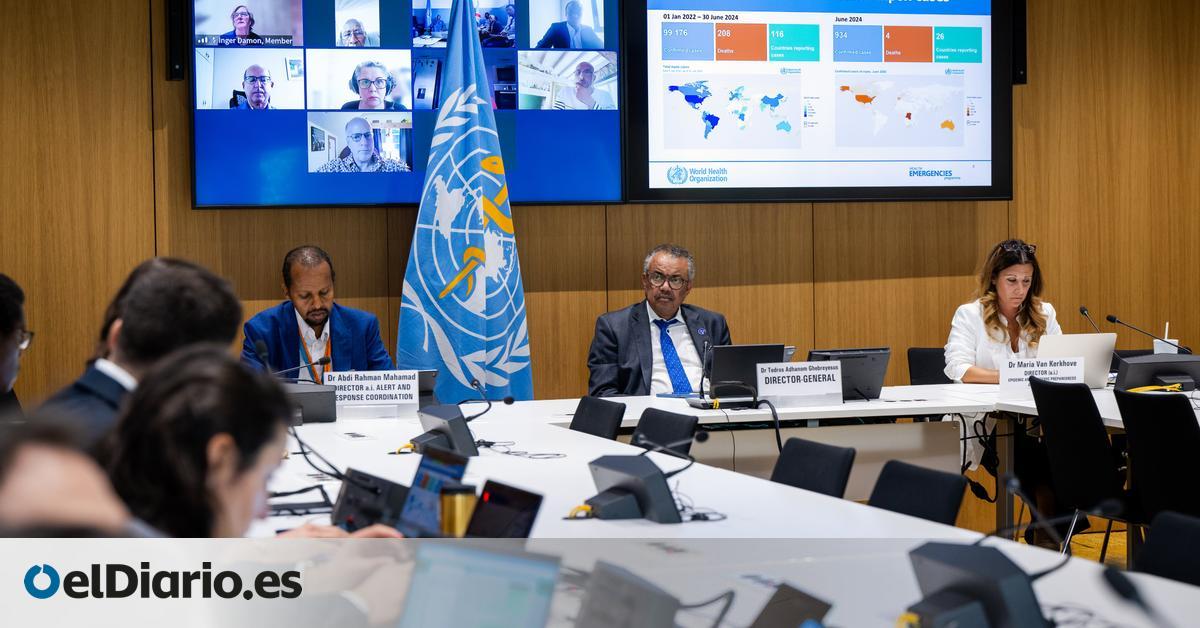
The current outbreaks of monkeypox, also known as mpox, are once again a public health emergency of international importance. This was decided on Wednesday by the World Health Organization (WHO) at a meeting of the Emergency Committee following the unprecedented increase in cases in several African countries. This is the highest level of alert included in the International Health Regulations and was already declared for this virus in 2022 after it spread to 70 countries. But on May 11, 2023, the global alert was lifted. Until today.
“The detection and rapid spread of a new variant, its emergence in countries that had not previously reported cases and the potential for it to spread across Africa and beyond is deeply worrying and requires a coordinated international response to stop outbreaks and save lives,” UN agency Director-General Tedros Adhanom Ghebreyesus said at a news conference.
The WHO decision comes a day after Africa’s main public health agency (CDC) also declared a health emergency due to the spread of the virus. In the last two years, the number of cases detected on that continent has continued to increase: since January 2022, 38,465 cases of monkeypox have been diagnosed and 1,465 deaths have occurred, with a prevalence increase of 79% in 2023 compared to 2022, according to CDC Africa data.
So far this year, there have been 160% more infections than in the same period last year and 524 people have died, according to data provided by the director general of the United Nations agency. Underdiagnosis is very high, experts agree, so these figures may only be the tip of the iceberg. The epicentre is in the Democratic Republic of Congo, the country with the most problems – especially among children, where the highest mortality is concentrated – although in the last month cases have been reported in Burundi, Kenya, Rwanda and Uganda.
The WHO initiates an international emergency when it assesses that there are implications for public health that go beyond the borders of the affected countries. Alerts of this type have been declared on eight occasions, including this one, since the beginning of the 2000s. Previously, it was COVID-19, swine flu, polio, Ebola or Zika. Once the emergency is activated, the WHO recommendations are temporary and require reviews every three months.
The cause for concern is a new variant (clade I) that emerged in September 2023 and is suspected to be more lethal than the variant that affected the planet in 2022 (clade II) and which remains the majority variant in the global outbreak.
“This new mutation appears to have started in a brothel in the Democratic Republic of Congo (DRC) and, as it can be transmitted through sexual contact and also directly between people, it is affecting adults and children,” the director of the Canary Islands University Institute of Tropical Diseases and Public Health, Jacob Lorenzo-Morales, told this newspaper last week.
According to the expert, clade I is more lethal, “with mortality rates of around 10% in children and with a more complex and prolonged clinical picture that leaves blisters for longer,” although there are still quite a few limitations in understanding the epidemiology and transmission, admit the African CDC. In addition, the African continent is having difficulties in establishing countermeasures to the epidemic such as vaccination, diagnostics or treatments. In addition, the situation must be managed at the same time as other outbreaks, such as cholera and Ebola, along with other socio-political problems that some countries are going through.
Monkeypox is a zoonosis (a disease transmitted between vertebrate animals and humans) caused by a DNA virus that is endemic in Central and Western Africa. It produces symptoms and has a presentation similar to those of smallpox – a disease eradicated since 1980 – but is less severe, transmissible and less fatal.
In countries like Spain, surveillance and vaccination made it possible to control transmission within a few months. From more than 7,500 cases detected in our country in 2022, the number rose to just over 300 in 2023. This year, however, there has been a slight upturn in Spain, which is a reminder that the disease has not been eliminated in developed countries. In fact, the Ministry of Health recalled last week the importance of completing the vaccination schedule. Only half of the people have done so (20,000 out of 40,000).
Source: www.eldiario.es

